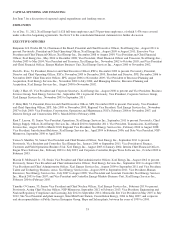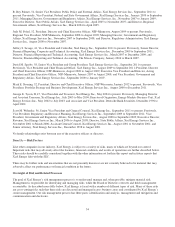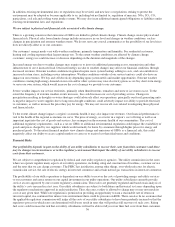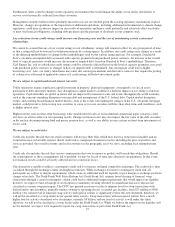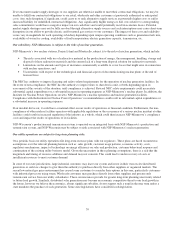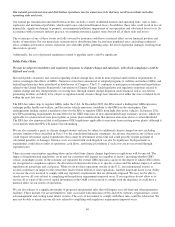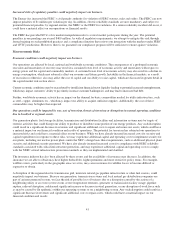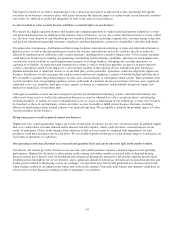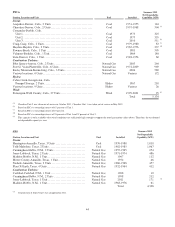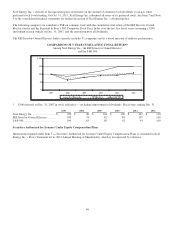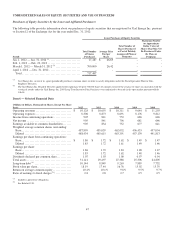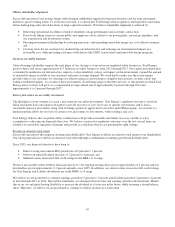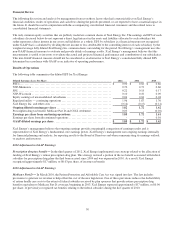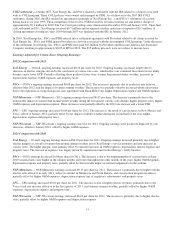Xcel Energy 2012 Annual Report Download - page 52
Download and view the complete annual report
Please find page 52 of the 2012 Xcel Energy annual report below. You can navigate through the pages in the report by either clicking on the pages listed below, or by using the keyword search tool below to find specific information within the annual report.42
The degree to which we are able to maintain day-to-day operations in response to unforeseen events, potentially through the
execution of our business continuity plans, will in part determine the financial impact of certain events on our financial condition
and results. It’s difficult to predict the magnitude of such events and associated impacts.
A cyber incident or cyber security breach could have a material effect on our business.
We operate in a highly regulated industry that requires the continued operation of sophisticated information technology systems
and network infrastructure. In addition, in the ordinary course of business, we use our systems and infrastructure to create, collect,
use, disclose, store, dispose of and otherwise process sensitive information, including company data, customer energy usage data,
and personal information regarding customers, employees and their dependents, contractors, shareholders and other individuals.
Our generation, transmission, distribution and fuel storage facilities, information technology systems and other infrastructure or
physical assets, as well as the information processed in our systems, infrastructure and assets could be directly or indirectly
affected by unintentional or deliberate cyber security incidents, including those caused by human error. Cyber security incidents
could harm our businesses by limiting our generating, transmitting and distributing capabilities, delaying our development and
construction of new facilities or capital improvement projects to existing facilities, disrupting our customer operations, or
exposing us to liability. As generation and transmission systems as well as natural gas pipelines are part of an interconnected
system, a disruption caused by the impact of a cyber security incident of the regional electric transmission grid, natural gas
pipeline infrastructure or other fuel sources or of our third party service providers’ operations, could also negatively impact our
business. In addition, we also anticipate that such an event would receive regulatory scrutiny at both the Federal and State level.
We are unable to quantify the potential impact of such cyber security threats or subsequent related actions. These potential cyber
security incidents and corresponding regulatory action could result in a material decrease in revenues and may cause significant
additional costs (e.g., penalties, third party claims, repairs, insurance or compliance) and potentially disrupt our supply and
markets for natural gas, oil and other fuels.
Although we maintain security measures designed to protect our information technology systems, network infrastructure and
other assets, these assets as well as the information they process may be vulnerable to cyber security incidents, including the
resulting disability, or failures of assets or unauthorized access to assets or information. If our technology systems were to fail or
be breached, or those of our third-party service providers, we may be unable to fulfill critical business functions, including
effectively maintaining certain internal controls over financial reporting. We are unable to quantify the potential impact of cyber
security incidents on our business.
Rising energy prices could negatively impact our business.
Higher fuel costs could significantly impact our results of operations if requests for recovery are unsuccessful. In addition, higher
fuel costs could reduce customer demand and/or increase bad debt expense, which could also have a material impact on our
results of operations. Delays in the timing of the collection of fuel cost recoveries as compared with expenditures for fuel
purchases could have an impact on our cash flows. We are unable to predict future prices or the ultimate impact of such prices on
our results of operations or cash flows.
Our operating results may fluctuate on a seasonal and quarterly basis and can be adversely affected by milder weather.
Our electric and natural gas utility businesses are seasonal, and weather patterns can have a material impact on our operating
performance. Demand for electricity is often greater in the summer and winter months associated with cooling and heating.
Because natural gas is heavily used for residential and commercial heating, the demand for this product depends heavily upon
weather patterns throughout our service territory, and a significant amount of natural gas revenues are recognized in the first and
fourth quarters related to the heating season. Accordingly, our operations have historically generated less revenues and income
when weather conditions are milder in the winter and cooler in the summer. Unusually mild winters and summers could have an
adverse effect on our financial condition, results of operations, or cash flows.



